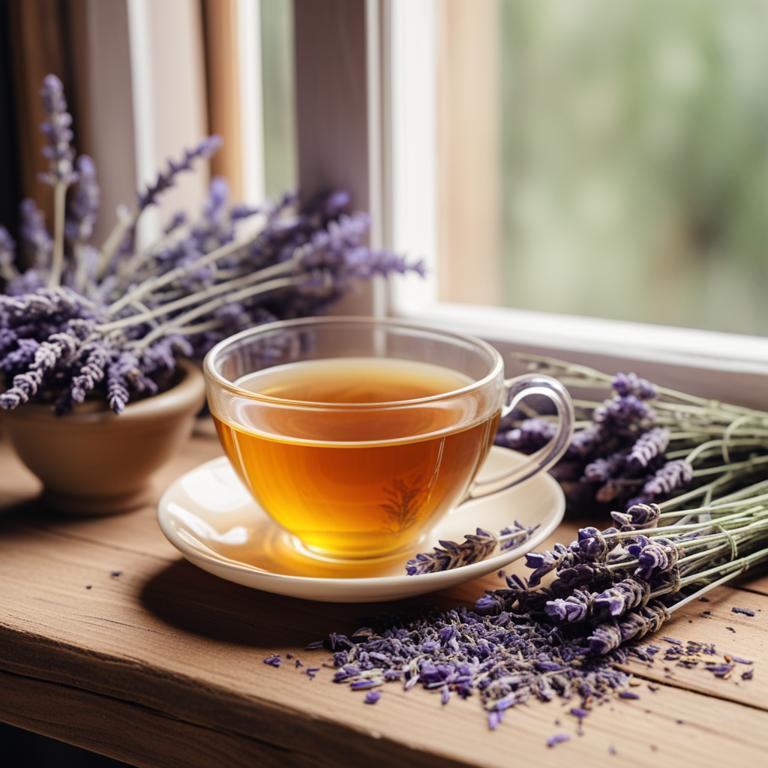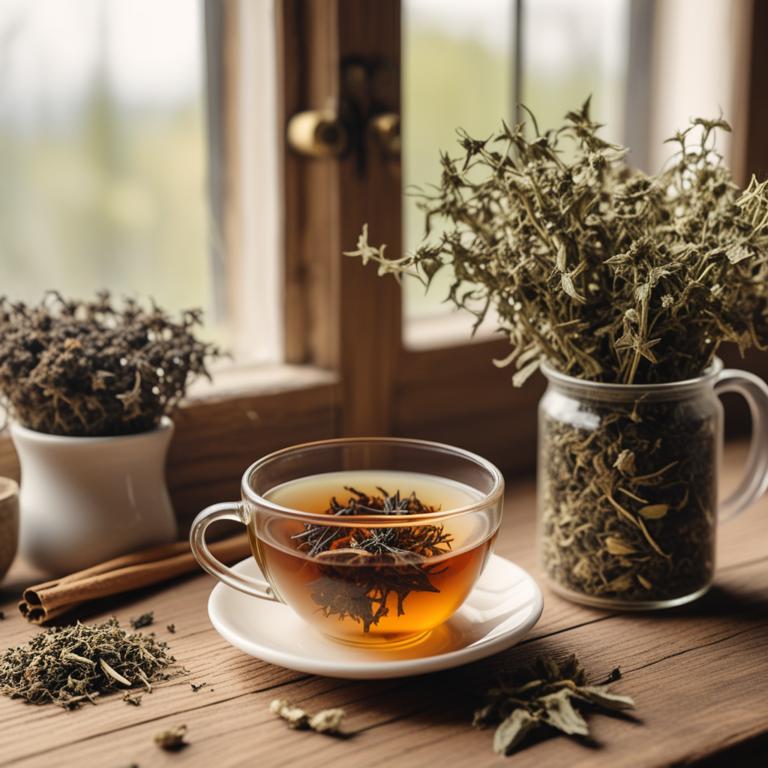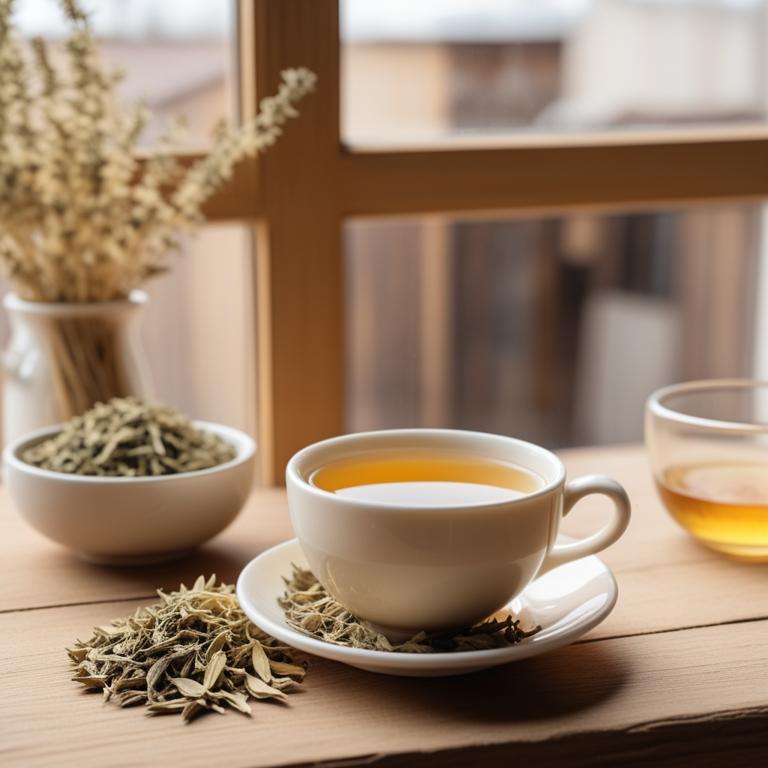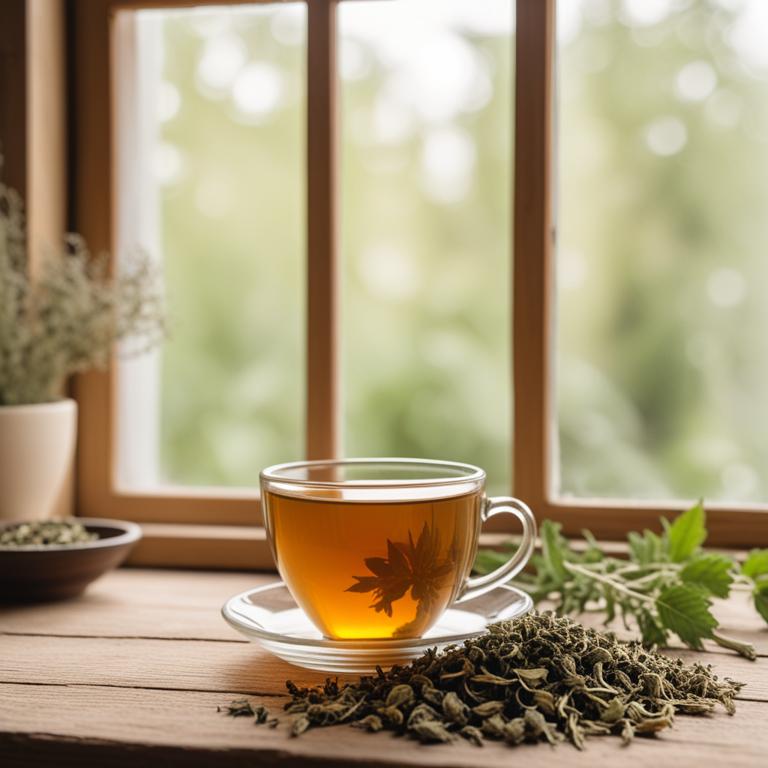11 Best Herbal Teas For Emphysema

Herbal teas for Emphysema are a type of natural remedy that involves drinking tea made from herbs to alleviate the symptoms of this chronic lung disease.
These teas are rich in antioxidants, flavonoids, and other compounds that help to reduce inflammation, improve lung function, and boost the immune system.
Some examples of herbal teas used to treat Emphysema include Ginger tea, which helps to reduce inflammation and improve digestion; Turmeric tea, which contains curcumin that has anti-inflammatory and antioxidant properties; Thyme tea, which has antimicrobial properties that help to combat infections; Peppermint tea, which helps to ease breathing and reduce congestion; Echinacea tea, which boosts the immune system and reduces inflammation; and Licorice root tea, which has anti-inflammatory and expectorant properties that help to reduce coughing and improve lung function.
By incorporating these herbal teas into their daily routine, individuals with Emphysema may experience improved lung function, reduced symptoms, and enhanced overall well-being.
According to "Phytomedicine : international journal of phytotherapy and phytopharmacology", teas for emphysema can be beneficial, as certain natural compounds such as gallic acid and quercetin found in tea have antioxidant and anti-inflammatory effects, which can help improve or protect the lung against this disease.
Below there's a list of the 11 best herbal teas for emphysema.
- 1. Eucalyptus globulus teas
- 2. Ginkgo biloba teas
- 3. Thymus vulgaris teas
- 4. Rosmarinus officinalis teas
- 5. Echinacea purpurea teas
- 6. Lavandula angustifolia teas
- 7. Zingiber officinale teas
- 8. Piper nigrum teas
- 9. Astragalus membranaceus teas
- 10. Silybum marianum teas
- 11. Panax quinquefolius teas
Also you may be interested in...
TODAY'S FREE BOUNDLE
Herb Drying Checklist + Herbal Tea Shopping List + Medicinal Herbs Flashcards
Enter you best email address below to receive this bundle (3 product valued $19.95) for FREE + exclusive access to The Aphotecary Letter.
$19.95 -> $0.00
1. Eucalyptus globulus teas

Eucalyptus globulus teas have been traditionally used to treat emphysema, an ailment characterized by damaged lung tissue and difficulty breathing.
The herbal preparation's expectorant properties help to relieve congestion and make it easier to cough up mucus, providing relief to individuals suffering from emphysema.
The bioactive constituents, including eucalyptol and flavonoids, exhibit anti-inflammatory and antioxidant activities, which may help to reduce inflammation and oxidative stress in the lungs, contributing to the treatment of emphysema.
By reducing inflammation and promoting the removal of mucus, Eucalyptus globulus teas may help to alleviate symptoms and improve lung function in individuals with emphysema.
Related Study
According to "African journal of traditional, complementary, and alternative medicines : AJTCAM", Eucalyptus globulus teas were identified as one of the important species used in the Togolese traditional medicine to treat respiratory issues, including emphysema and asthma symptoms.
2. Ginkgo biloba teas

Ginkgo biloba teas have been traditionally used to treat emphysema, a chronic lung disease characterized by shortness of breath and progressive damage to the lung tissue.
The antioxidant and anti-inflammatory properties of Ginkgo biloba teas help to treat this ailment by reducing oxidative stress and inflammation in the lungs, thereby improving lung function and overall respiratory health.
The bioactive constituents of Ginkgo biloba teas, including flavonoids, terpenoids, and bilobalide, contribute to its therapeutic effects by scavenging free radicals, modulating immune responses, and promoting vasodilation, which helps to improve oxygenation of the lungs.
The benefits of Ginkgo biloba teas in treating emphysema include improved lung function, reduced symptoms of shortness of breath, and enhanced quality of life, making it a popular natural remedy for this chronic condition.
3. Thymus vulgaris teas

Thymus vulgaris teas, derived from the leaves of the thyme plant, have been studied for their potential to treat emphysema, a chronic lung disease characterized by shortness of breath and difficulty breathing.
The anti-inflammatory and antioxidant properties of thymus vulgaris teas, which include thymol and carvacrol as primary bioactive constituents, help to reduce inflammation and oxidative stress in the lungs, thereby alleviating symptoms of emphysema.
By promoting the repair of lung tissue and improving lung function, thymus vulgaris teas may help to slow the progression of emphysema and improve overall quality of life for individuals suffering from this condition.
The benefits of using thymus vulgaris teas to treat emphysema include reduced inflammation, improved lung function, and enhanced antioxidant defenses, making it a promising natural remedy for managing this chronic lung disease.
Related Study
According to "Frontiers in pharmacology", Thymus vulgaris teas for emphysema may be beneficial due to the presence of various phytochemical constituents, including phenolic and flavonoid compounds, which have been shown to possess antioxidant, antimicrobial, and potential therapeutic properties.
4. Rosmarinus officinalis teas

Rosmarinus officinalis teas have been studied for their potential benefits in treating emphysema, a chronic respiratory disease characterized by progressive damage to lung tissue.
The properties of this herbal preparation, including its antioxidant and anti-inflammatory effects, help to reduce oxidative stress and inflammation in the lungs, which are key factors in the progression of emphysema.
The bioactive constituents of Rosmarinus officinalis, such as rosmarinic acid, carnosic acid, and camphor, have been found to have anti-inflammatory and antioxidant properties that may help to slow down the progression of emphysema.
By reducing inflammation and oxidative stress, Rosmarinus officinalis teas may help to alleviate symptoms of emphysema, such as shortness of breath and coughing, and improve overall lung function.
5. Echinacea purpurea teas

Echinacea purpurea teas have been traditionally used to treat emphysema, a chronic respiratory disease characterized by shortness of breath and difficulty breathing.
The anti-inflammatory and antioxidant properties of this herbal preparation help to reduce inflammation and oxidative stress in the lungs, making it easier to breathe.
The bioactive constituents of Echinacea purpurea, including alkylamides, glycosides, and phenolic acids, have been shown to modulate the immune system and reduce inflammation, which can help to slow down the progression of emphysema.
Drinking Echinacea purpurea teas regularly may also help to improve lung function and reduce symptoms of emphysema, such as shortness of breath and coughing.
Related Study
According to "Recent patents on biotechnology", Echinacea purpurea teas may exhibit potential for adjuvant symptomatic therapy in respiratory conditions, such as emphysema.
6. Lavandula angustifolia teas

Lavandula angustifolia teas, derived from the flowers of the lavender plant, have been traditionally used to treat respiratory issues such as emphysema.
The anti-inflammatory and antioxidant properties of this herbal preparation help to soothe and calm the airways, reducing inflammation and promoting relaxation.
The bioactive constituents, including linalool and linalyl acetate, have been found to have bronchodilatory effects, helping to ease breathing and improve lung function.
Regular consumption of Lavandula angustifolia teas has been reported to provide relief from emphysema symptoms, including shortness of breath and coughing, and may also help to slow down the progression of the disease.
7. Zingiber officinale teas

Zingiber officinale teas, also known as ginger tea, have been studied for their potential to treat emphysema, a chronic respiratory disease characterized by damaged lung tissue.
The anti-inflammatory and antioxidant properties of Zingiber officinale, particularly its gingerols and shogaols, help to reduce inflammation and oxidative stress in the lungs, thereby alleviating symptoms of emphysema.
Bioactive constituents such as gingerol and shogaol have been shown to inhibit the production of pro-inflammatory cytokines and enzymes, which contribute to lung damage and progression of emphysema.
The benefits of Zingiber officinale tea in treating emphysema include improved lung function, reduced shortness of breath, and enhanced quality of life for patients with this debilitating disease.
Related Study
According to the study, Zingiber officinale teas may be beneficial for emphysema as lariciresinol, a compound found in Zingiber officinale, was identified as a potential efflux pump inhibitor that could lead to effective killing of drug-resistant bacteria, suggesting its potential anti-inflammatory and antimicrobial properties may help alleviate respiratory disorders such as emphysema.
8. Piper nigrum teas

Piper nigrum teas, made from the berries of the black pepper plant, have been found to possess anti-inflammatory and antioxidant properties that aid in the treatment of emphysema, a chronic lung disease.
The bioactive constituents of piper nigrum, including piperine and beta-carophyllene, help to reduce inflammation and oxidative stress in the lungs, thereby slowing down the progression of the disease.
By reducing inflammation and promoting healthy lung function, piper nigrum teas may help to alleviate symptoms of emphysema, such as shortness of breath and coughing.
The benefits of using piper nigrum teas to treat emphysema include improved lung function, reduced inflammation, and enhanced overall respiratory health.
9. Astragalus membranaceus teas

Astragalus membranaceus teas have been traditionally used to treat emphysema due to their anti-inflammatory and antioxidant properties.
This herbal preparation helps to treat emphysema by improving lung function and reducing inflammation in the airways, making it easier to breathe.
The bioactive constituents of Astragalus membranaceus teas, including flavonoids, saponins, and polysaccharides, contribute to its therapeutic effects by boosting the immune system and protecting lung tissue from oxidative damage.
The benefits of using Astragalus membranaceus teas to treat emphysema include improved respiratory function, reduced symptoms of shortness of breath and coughing, and enhanced overall quality of life.
10. Silybum marianum teas

Silybum marianum teas, also known as milk thistle teas, have been traditionally used to treat emphysema, a chronic respiratory disease characterized by shortness of breath and difficulty breathing.
The properties of this herbal preparation that help to treat emphysema include its anti-inflammatory and antioxidant properties, which help to reduce inflammation and oxidative stress in the lungs.
The bioactive constituents of Silybum marianum teas, such as silymarin and flavonoids, have been shown to help treat emphysema by protecting the lungs from oxidative damage, improving lung function, and reducing the severity of symptoms.
The benefits of using Silybum marianum teas to treat emphysema include improved lung function, reduced symptoms, and enhanced overall quality of life.
11. Panax quinquefolius teas

Panax quinquefolius teas, also known as American ginseng tea, have been studied for their potential in treating emphysema, a respiratory disease characterized by damaged lung tissue.
The anti-inflammatory and antioxidant properties of Panax quinquefolius teas help to reduce inflammation and protect lung cells from damage, which can slow the progression of emphysema.
The bioactive constituents of this herbal preparation, including ginsenosides and polyphenols, have been shown to have anti-inflammatory and antioxidant effects, which can help to repair lung tissue and improve respiratory function.
The benefits of using Panax quinquefolius teas to treat emphysema include improved lung function, reduced shortness of breath, and a reduction in the risk of respiratory infections.